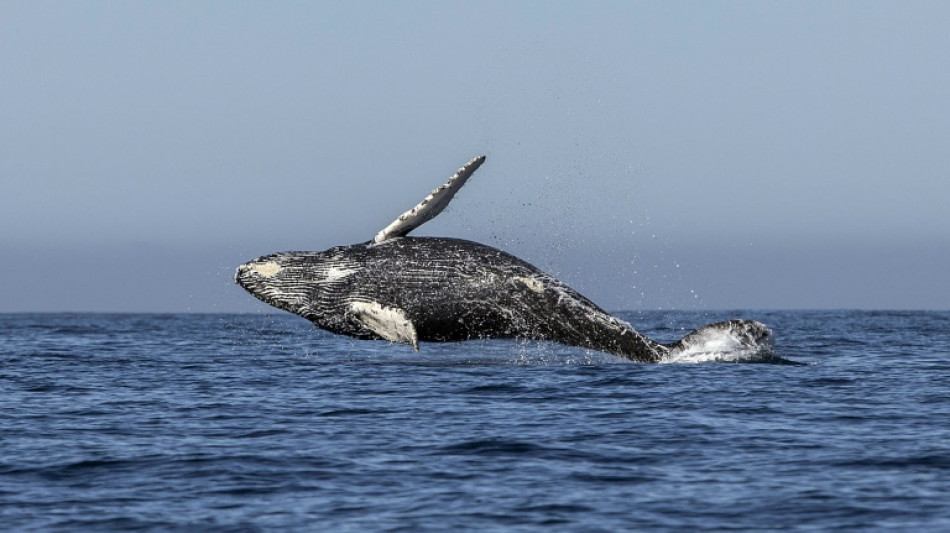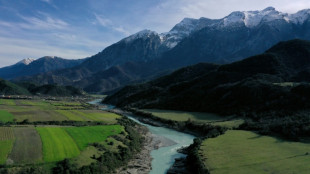
-
 Fermin Lopez brace hands Barca win at Slavia Prague
Fermin Lopez brace hands Barca win at Slavia Prague
-
Kane double fires Bayern into Champions League last 16

-
 Newcastle pounce on PSV errors to close in on Champions League last 16
Newcastle pounce on PSV errors to close in on Champions League last 16
-
In Davos speech, Trump repeatedly refers to Greenland as 'Iceland'

-
 Liverpool see off Marseille to close on Champions League last 16
Liverpool see off Marseille to close on Champions League last 16
-
Caicedo strikes late as Chelsea end Pafos resistance

-
 US Republicans begin push to hold Clintons in contempt over Epstein
US Republicans begin push to hold Clintons in contempt over Epstein
-
Trump says agreed 'framework' for US deal over Greenland

-
 Algeria's Zidane and Belghali banned over Nigeria AFCON scuffle
Algeria's Zidane and Belghali banned over Nigeria AFCON scuffle
-
Iran says 3,117 killed during protests, activists fear 'far higher' toll

-
 Atletico frustrated in Champions League draw at Galatasaray
Atletico frustrated in Champions League draw at Galatasaray
-
Israel says struck Syria-Lebanon border crossings used by Hezbollah

-
 Snapchat settles to avoid social media addiction trial
Snapchat settles to avoid social media addiction trial
-
'Extreme cold': Winter storm forecast to slam huge expanse of US

-
 Jonathan Anderson reimagines aristocrats in second Dior Homme collection
Jonathan Anderson reimagines aristocrats in second Dior Homme collection
-
Former England rugby captain George to retire in 2027

-
 Israel launches wave of fresh strikes on Lebanon
Israel launches wave of fresh strikes on Lebanon
-
Ubisoft unveils details of big restructuring bet

-
 Abhishek fireworks help India beat New Zealand in T20 opener
Abhishek fireworks help India beat New Zealand in T20 opener
-
Huge lines, laughs and gasps as Trump lectures Davos elite

-
 Trump rules out 'force' against Greenland but demands talks
Trump rules out 'force' against Greenland but demands talks
-
Stocks steadier as Trump rules out force to take Greenland

-
 World's oldest cave art discovered in Indonesia
World's oldest cave art discovered in Indonesia
-
US hip-hop label Def Jam launches China division in Chengdu

-
 Dispersed Winter Olympics sites 'have added complexity': Coventry
Dispersed Winter Olympics sites 'have added complexity': Coventry
-
Man City players to refund fans after Bodo/Glimt debacle

-
 France's Lactalis recalls baby formula over toxin
France's Lactalis recalls baby formula over toxin
-
Pakistan rescuers scour blaze site for dozens missing

-
 Keenan return to Irish squad boosts Farrell ahead of 6 Nations
Keenan return to Irish squad boosts Farrell ahead of 6 Nations
-
US Treasury chief accuses Fed chair of 'politicising' central bank

-
 Trump rules out force against Greenland but demands 'immediate' talks
Trump rules out force against Greenland but demands 'immediate' talks
-
Israeli strike kills three Gaza journalists including AFP freelancer

-
 US Congress targets Clintons in Epstein contempt fight
US Congress targets Clintons in Epstein contempt fight
-
Huge lines, laughs and gasps as Trump addresses Davos elites

-
 Trump at Davos demands 'immediate' Greenland talks but rules out force
Trump at Davos demands 'immediate' Greenland talks but rules out force
-
Australia pauses for victims of Bondi Beach shooting

-
 Prince Harry says tabloid coverage felt like 'full blown stalking'
Prince Harry says tabloid coverage felt like 'full blown stalking'
-
Galthie drops experienced trio for France's Six Nations opener

-
 Over 1,400 Indonesians leave Cambodian scam groups in five days: embassy
Over 1,400 Indonesians leave Cambodian scam groups in five days: embassy
-
ICC rejects Bangladesh's plea to play T20 World Cup matches outside India

-
 Prince Harry says UK tabloid court battle in 'public's interest'
Prince Harry says UK tabloid court battle in 'public's interest'
-
Trump lands in Davos to push Greenland claims

-
 Balkan wild rivers in steady decline: study
Balkan wild rivers in steady decline: study
-
Injured Capuozzo misses out on Italy Six Nations squad

-
 Mourners pay last respects to Italian icon Valentino
Mourners pay last respects to Italian icon Valentino
-
EU parliament refers Mercosur trade deal to bloc's top court

-
 Odermatt seeks first Kitzbuehel victory with eye on Olympics
Odermatt seeks first Kitzbuehel victory with eye on Olympics
-
Italy's Brignone to be rested for Spindleruv Mlyn giant slalom

-
 Alcaraz spearheads big names into Australian Open third round
Alcaraz spearheads big names into Australian Open third round
-
European stocks dip ahead of Trump's Davos speech


Heatwaves may be driving whale decline in Pacific: study
The number of North Pacific humpback whales plummeted 20 percent in less than a decade, and marine heatwaves may be the main culprit, according to a study released Wednesday that spells a troubled future for the majestic sea mammals.
Thanks to conservation efforts and the end of commercial whaling in 1976, the region's humpback population steadily increased until 2012.
But over the last decade, whale numbers have declined sharply, researchers reported in the journal Royal Society Open Science.
A team of 75 scientists compiled the largest photo-identification dataset ever created for a large marine mammal to track North Pacific humpback populations from 2002 to 2021.
Using images of the whale's unique tails the team was able to log some 200,000 sightings of more than 33,000 individuals.
Up to 2012 the humpback population steadily increased, and it was widely assumed it would eventually level off at their natural "carrying capacity" -- the number of whales the ocean can support.
Instead, they saw a steep population decline.
From 2012 to 2021 the number of humpbacks fell 20 percent from some 33,000 individuals to just over 26,600.
For a subset of whales that wintered in Hawaii, the drop was even more pronounced: 34 percent.
That turned out to be a highly significant difference.
From 2014 through 2016 the strongest and longest marine heatwave ever recorded ravaged the Pacific northeast with temperate anomalies sometimes exceeding three to six degrees Celsius, altering the marine ecosystem and the availability of humpback prey.
"My jaw was on the floor," study author Ted Cheeseman, whale biologist and a PhD student at Southern Cross University in New South Wales, told AFP. "This is a much bigger signal than we expected."
"Our estimation is that about 7,000 whales mostly starved to death," he said.
It is normal even in healthy populations for numbers to fluctuate, but such an abrupt decline for a long-lived species points to a major disruption in the oceans.
- 'The ceiling crashed' -
In this case, the scientists speculate, the extreme marine heat actually reduced the carrying capacity threshold for humpbacks.
"Instead of the whales coming up to the ceiling, the ceiling crashed down on the whales," Cheeseman said.
The fact that humpbacks were unable to shift their already flexible diet is a telltale indicator for overall ocean health.
"It's not just the whales' food that declined," Cheeseman added, noting drops in the populations of tufted puffins, sea lions, and seals. "A warmer ocean produces less food."
Some commercial fisheries also felt the impact.
According to the Intergovernmental Panel on Climate Change, marine heatwaves -- already more frequent and intense -- are projected to increase globally over the course of this century.
- Still a success story -
For hundreds of years, whalers from across the planet hunted humpback whales for their oil, meat and baleen, their feeding filtration system.
By 1986, the IUCN had listed the species as globally endangered.
Humpback whales continue to face threats today, primarily from ship strikes and entanglements in fishing nets.
But international restrictions on commercial whaling allowed the global humpback whale population to rebound to more than 80,000 mature individuals.
But today conservation goes hand-in-hand with climate action.
"It is a great success story that these whales are no longer in immediate danger of extinction like they were 50 years ago," Cheeseman said.
"And yet, there's a new reality of changing oceans that we have to live with."
F.Mueller--VB




